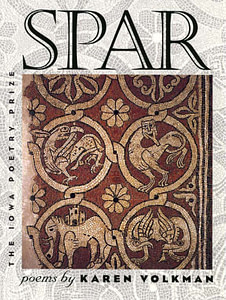Jordan Davis Reviews Karen Volkman's Spar
Karen Volkman
University of Iowa Press, 2002
Reviewed by: Jordan Davis
February 17, 2003
// The Constant Critic Archive //
I am ambivalent about Karen Volkman’s poetry. I’m aware, as I read her second book, Spar, of a continuous subliminal excitement, the kind I trust in some writers from Mallarme on to lead me somehow to an undeniable ineffable experience. I also get a sense of pervasive gloom.
“Why are you here all alone? Why don’t you go out and play with the others?”
Now I do not love the questions of strangers, which tug close to the loop and haggle in the throat. Yes there are cliffs to climb on, rust and white. Yes there are manyweathered skeletons to startle. But here the liltflowers tilt down livid in the vase, like red cat cries, the sheerest slips of seeing. (5)
The compound words, the alliteration, the ambiguous substitutions (“haggle” for catch, “loop” for I’m not sure what, “manyweathered skeletons” for other children), all make this passage sonically-rich, synesthetic, and unsettlingly inward. In this prose poem, inversion is the point, a reasonable defense against the social unknowns of dealing with other animate beings—why not invent a world out of the strong obvious sensory perceptions of objects by light, color, and touch, and let the give-and-take of communication fall as it may? It’s a rhetorical question—it’s hard to get by without affection, is why not. Nevertheless, Volkman chooses another answer. Why not?

The prose poems in Spar offer no titles to spell out their goth scenes, but it’s not too tricky to see which dots connect. Scanning the first paragraph in the book, I find many devaluing or frightening words: “mawkish . . . offends . . . grimace . . . roar . . .wouldn’t . . . too . . . hardly . . . but what about . . . dubious . . . shriller . . . tornado and scar . . . lacking grace . . . imperious” (2) all in half a page of prose warning someone (herself?) they’re being observed, recorded, and prepared to be judged:
Today is a lot of work, yesterday wiser. Yesterday is a path made out of feet, today is a screwball alarmclock with a mawkish tick. Today offends everyone with nebulous gesture: “I think.” “Yes but.” “Still really.” “Gee well.” This becomes language you know becomes destiny, still you know that operator listening in on the phone? She of the darker stare and windy grimace? Yes she is writing every word, I wouldn’t leave the blur too conspicuous, knapsack of roar. I wouldn’t give just anyone access, but you know best. Seems to me you go out a little too spryly, hardly a step really more of a sprawl.
It may not be possible to get past her horrific rewrite of the folk-image of making the road by walking. It’s true that Carolyn Forche wrote a noteworthy poem starring a pile of ears, but in “The Colonel,” that disturbing image is anticipated (“Broken bottles were embedded in the walls around the house . . .” ), context established, and reader debriefed—Volkman’s feet don’t even delay her from the appointed parallelism.
But enough about the gloom, and more about the almost indistinguishable tension. Volkman sets out a conflict that defines her style and matter here. Memory and the topographies of past mood may be horrifying, but they are more private and more stable, and therefore more available for a writer, than present-tense activity, which hasn’t had the vacuity or vagueness pressed out of it yet. However, today is where all the action, the life is, and Volkman is a lively poet.
There are lines throughout Spar that live up to the promise of her ambiguous and menacing epigraphs from Traherne, Blanchot, and Hans Christian Anderson. I like the qualifying, sensuous tone of this one from a piece about imagining boys are seducers: “And name it a kinder conquer, when the girls are all frantic rustle and fragrant wrist” (4). “The farmer tends his arid acre, space between if and when” (48). And most promisingly, “If kiss were conquest, were conclusion, I might be true. In the bluebit, heartquit leaping I might be blinded.”
I would have preferred more lineated poems (lyrics) in Spar. “May” brings the texture of her prose poetry to the efficient pacing and pointedness of her first book:
In May’s red ruse and smattered ravishings
you one, you two, you three your cruder schemes,
you blanch black lurk and blood the pallid boneand hum scald need where the body says I am
and the rose sighs Touch me, I am dyingin the pleatpetal purring of mouthweathered May. (9)
It’s over the top, but Volkman’s so controlled that when she gets release there’s all the more contrast. I’m reminded of “The Pregnant Lady Playing Tennis” from Crash’s Law, the tension being the tension Volkman’s often drawn to, of a woman not accepting conventional restrictions:
From the other courts,
the players watch, dismayed, half-fearing
for the safety of the lady playing tennis,
half-wishing this odd distraction shut away.
The heroine of the poem takes a play from the early Tom Hanks vehicle, Bachelor Party, and “plants/a crazy slam past the net: past the lines,/past the out zone, past the court’s steel network wall.” Volkman’s remarked that she intended the prose pieces in Spar to manifest conflicts, and that she is interested more in the book-length work than the individual poem, citing C.D. Wright and Anne Carson as points of reference. And she does achieve the warlike density and confusion of their work, for whatever that may be worth. May the resolution of her conflicts lead to more radiant clarities, and soon.
COMMENTS:
None.